General
Centre of Excellence in Sickle Cell Anemia Launched as Mak Hosts AAP Meeting
Published
10 months agoon
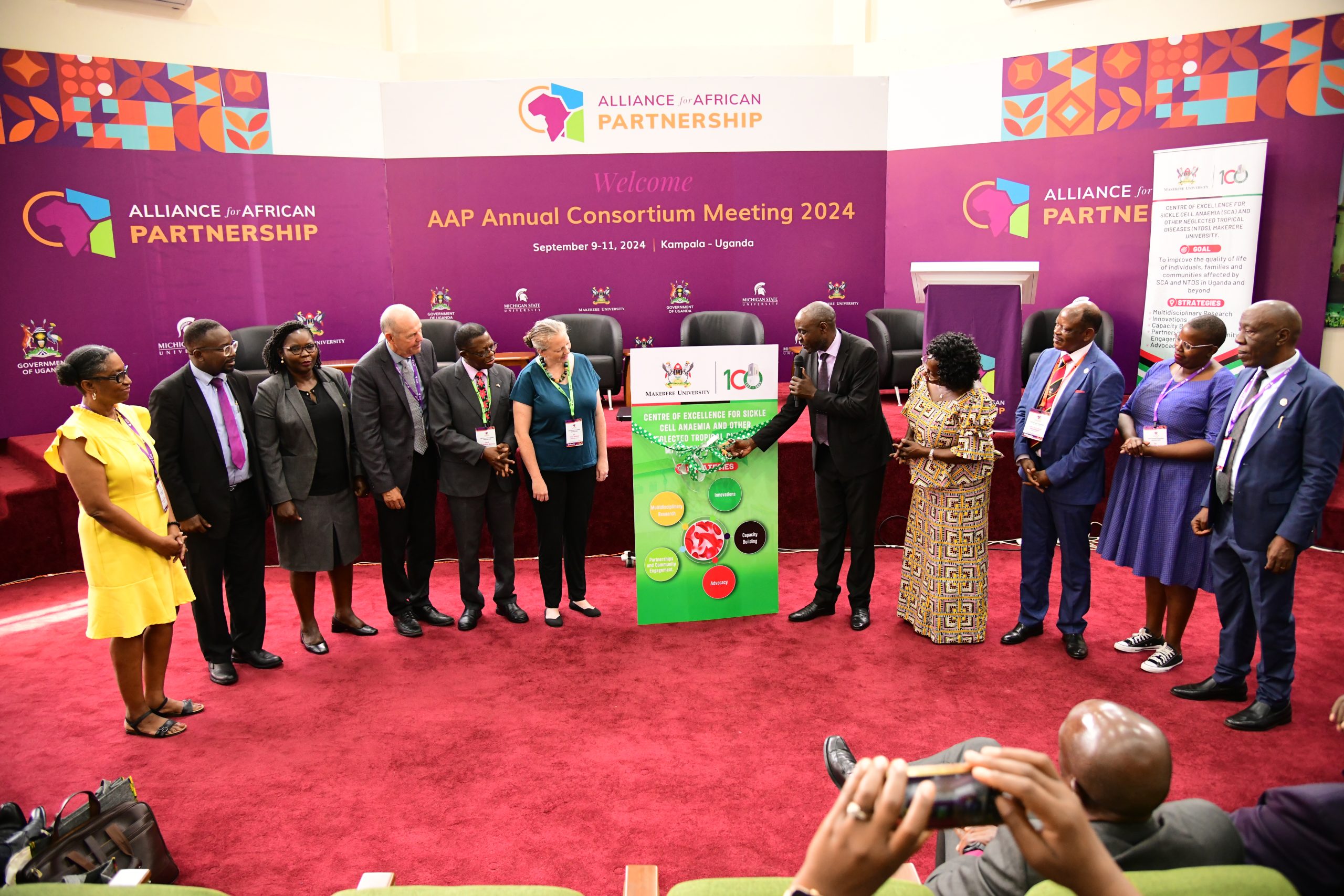
The State Minister for Higher Education Hon. Dr. J.C. Muyingo represented by the Commissioner in Charge of Admissions and Student Affairs Mr. Muzamil Mukwatampola on 9th September 2024 officially launched the Centre of Excellence for Sickle Cell Anemia and Other Neglected Tropical Diseases at the Alliance for African Partnership (AAP) of Michigan State University (MSU) Annual Consortium Meeting. Hosted by Makerere University in the School of Public Health Conference Hall, the three-day event that concluded on 11th September 2024 included an Annual Business Meeting, and a networking event hosted by the US Embassy and the US Ambassador to Uganda, H.E. William W. Popp.
The Annual gathering also included a Meeting with Members of Top Management, a tour of the Mak Innovation Hub, an AAP Advisory Board Meeting, a Public Dialogue on pioneering change and transforming institutions, a Student Recruitment Event by MSU, and a Forum on how African and global funders have worked across sectors for impactful programming.
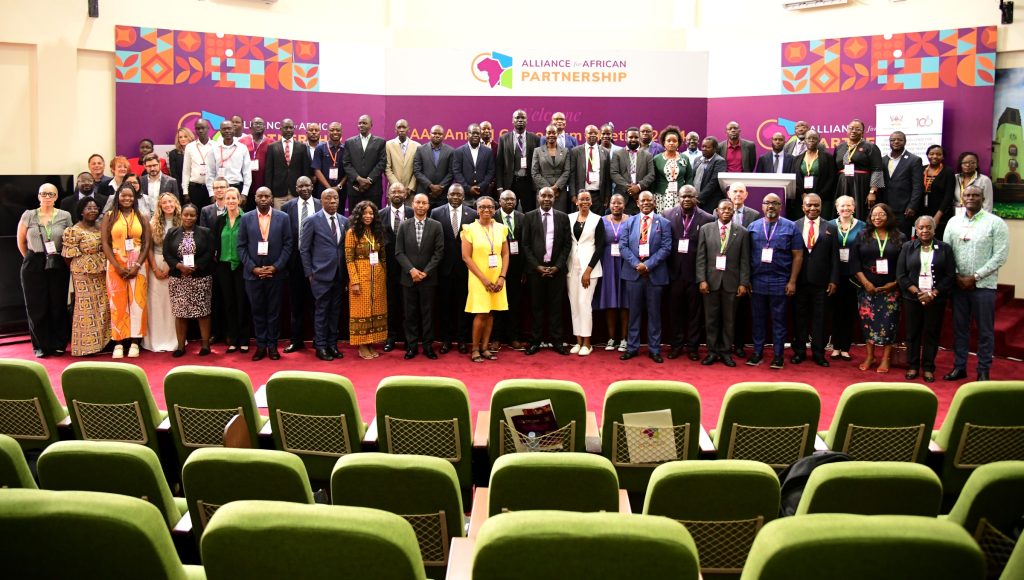
Opening Ceremony
Addressing participants at the opening event on 9th September, the Vice Chancellor, Prof. Barnabas Nawangwe acknowledged that it was a privilege for Makerere to host the Annual Consortium Meeting as it presents a lot of opportunities for AAP members to deliberate on innovations that can contribute to the betterment of humanity. Narrating a firsthand account of the loss of loved ones to Sickle Cell Disease, he added that Makerere can work together with consortia such as AAP to alleviate Africa’s health challenges.
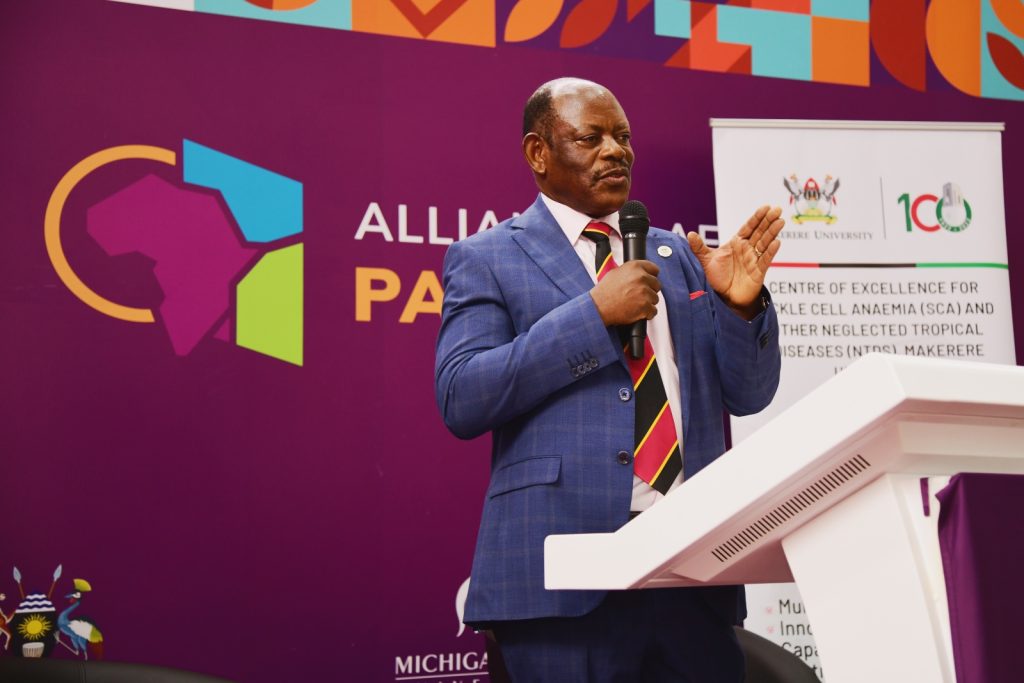
Prof. Nawangwe also current Chair of the AAP Advisory Board therefore expressed happiness that the funds used to start the Centre of Excellence for Sickle Cell Anemia and Other Neglected Tropical Diseases were received from Government of Uganda through the Makerere University Research and Innovation Fund (Mak-RIF). He invited all AAP Members to utilize Centre’s resources to conduct research on Sickle Cell Anemia and NTDs. The Centre is headed by Prof. Sarah Kiguli, a Professor of Paediatrics and Child Health at the College of Health Sciences (CHS).
Delivering the opening remarks, Prof. Steven Hanson the MSU Vice Provost and Dean for International Studies and Programs thanked Makerere University for the demonstrable leadership in tackling challenges such as Sickle Cell Anemia and Neglected Tropical Diseases.
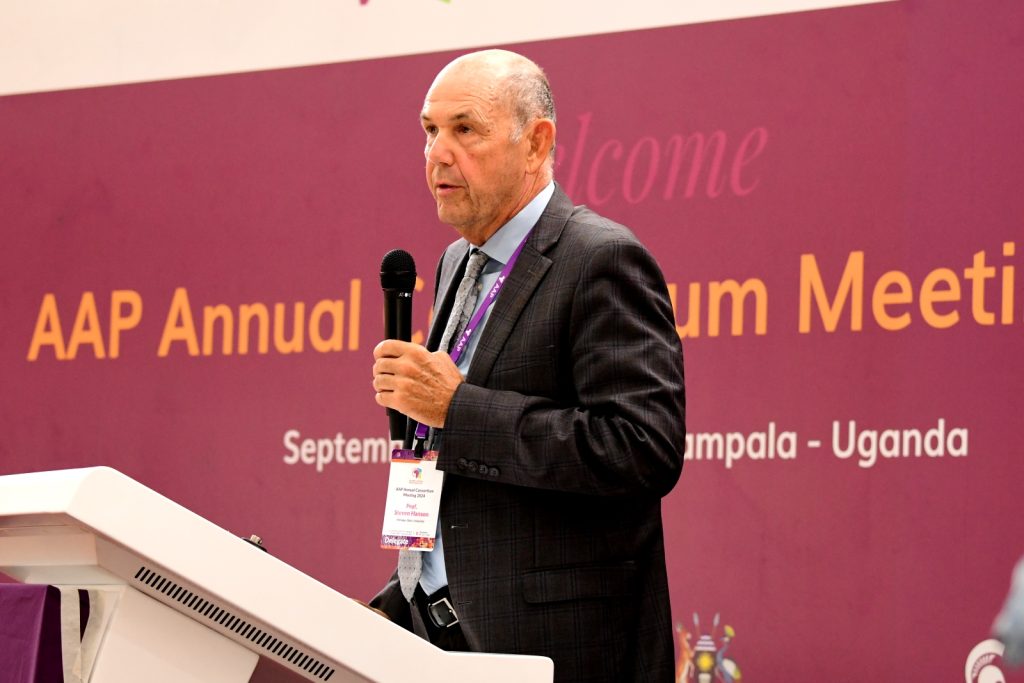
“When an institution like invests its resources, creates infrastructure and prioritises addressing big problems like these by creating a Centre for Excellence, we have an obligation to not just learn from them but to work together alongside them because we know that in a global society, challenges faced by one community affect us all, and solutions built together help us all” he added.
Adding his voice to the congratulatory messages, Mr. Mukwatampola on behalf of Dr. J.C. Muyingo noted that the Centre of Excellence will serve as a beacon of hope for not only treating Sickle Cell Anemia and Neglected Tropical Diseases but also fostering research and collaboration that plays a pivotal role in bridging the gap between new findings and treatment.
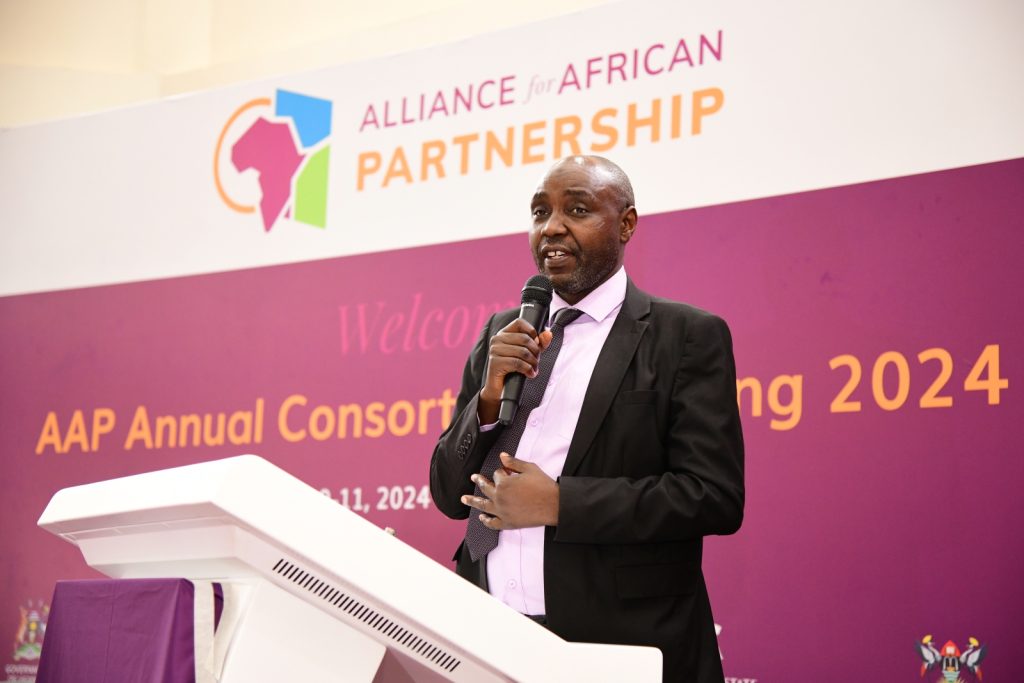
“This launch therefore underscores the NRM Government’s commitment to strengthening healthcare systems and prioritizing diseases that have long been neglected” added the State Minister’s remarks.
The opening ceremony also played witness to the announcement of Prof. David Meya an Infectious Disease physician at the College of Health Sciences (CHS) as the Oliver Reginald Tambo Africa Research Chair Initiative (ORTARChI) for Infectious Diseases recipient. The announcement was made by Dr. Dorothy Ngila, Director of Strategic Partnerships at the National Research Foundation of South Africa (NRF).
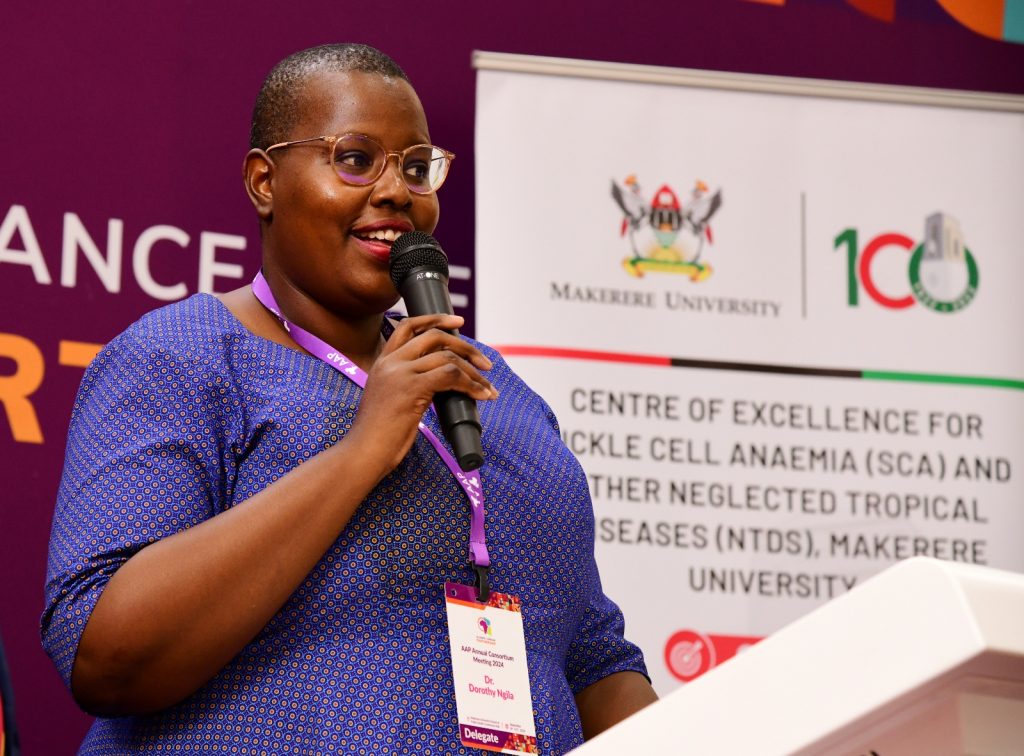
“The panel found the University (Makerere)’s involvement in AAP, RUFORUM, ARUA, AAUN, WUN, and many other university networks really excellent and on the basis of this was satisfied that the Chair would be in good hands to support the developmental trajectory of not only Uganda but also East Africa and the rest of the continent” remarked Dr. Ngila, also Vice Chair of the AAP Advisory Board.
AAP Dialogue in line with the AU Year of Education (2024)
The Vice Chancellor opened the Dialogue held 10th September 2024 on a philosophical note, by quoting Presidents Mandela and Nyerere.
“Education is the most powerful weapon which you can use to change the world.”
PRESIDENT NELSON MANDELA
“We must run while they walk”.
MWALIMU JULIUS KAMBARAGE NYERERE
Taking note of the World Bank recommendation that Africa must produce as many as 100,000 PhDs over the next ten years so as to move the continent out of poverty, Prof. Nawangwe stated that “Education is extremely important and it is important for us to understand what kind of education will transform our continent.”
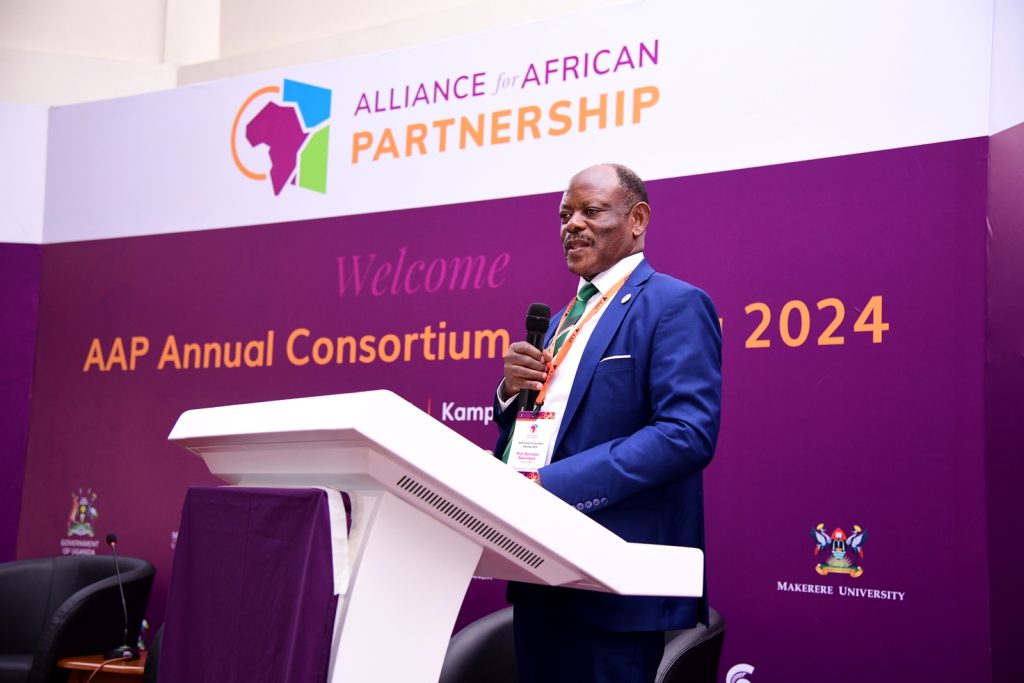
However, and on the question of quantity versus quality and relevance, he further explained that for the African case, “any education is important and relevant.” This he amplified by stating that how the recipient of that education uses it to transform themselves and society is what renders it relevant.
Delivering the keynote address, Dr. Thangavel Palanivel, UNDP Uganda Senior Economic Advisor applauded Makerere’s role as a lighthouse among African Universities by pioneering change and transforming institutions through not only educating future leaders but also contributing to research, innovations as well as shaping policy and strategy. He added that Makerere and other Universities have the dual role of responding to emerging needs, challenges and opportunities as well as developing the knowledge and skills of youth to match the changing labour market.
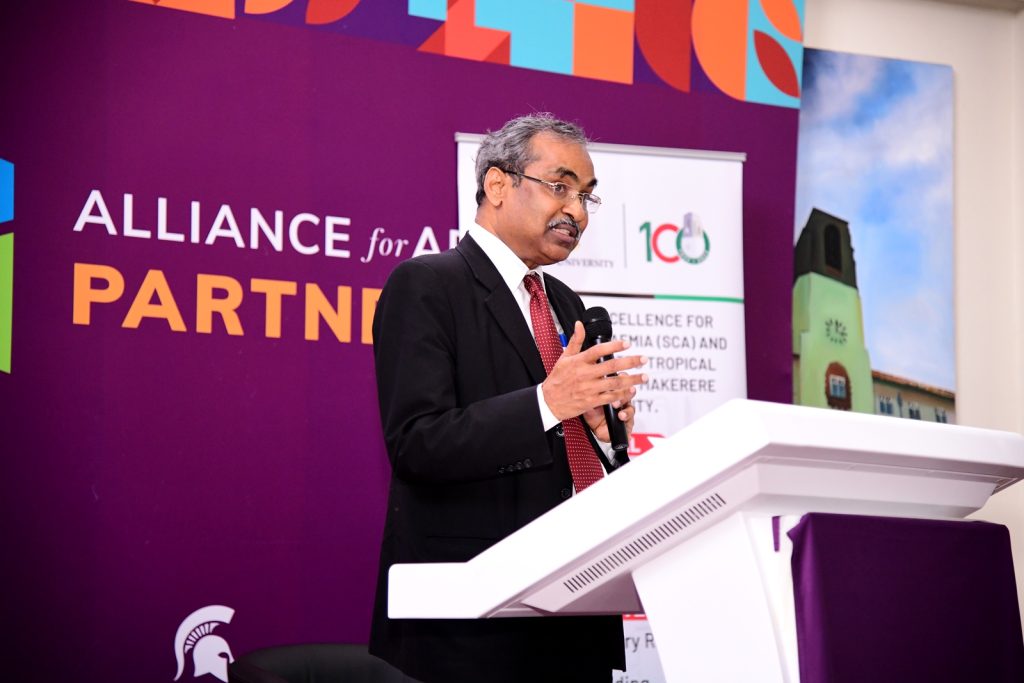
He went on to outline what UNDP sees as potential areas of change as; Digital Transformation and Artificial Intelligence, Innovation in Curricula to address mismatches in the labour market, Interdisciplinary undertakings, Enhanced Research and Innovation, Community Engagement as well as Leadership and Governance that embraces flexibility.
Dr. Palanivel outlined UNDP’s commitment to continue providing unlimited technical support to institutions as well as supporting initiatives such as Innovation Hubs at Makerere and Kabale University, and supporting the Policy Lab at Makerere University to foster implementation of the Parish Development Model (PDM).
Panelists have their say
The discussion that followed the keynote had as panelists; Prof. Brendan Cantwell – Erickson Distinguished Chair in Higher Education at MSU, Dr. Elizabeth Nansubuga – Higher Education Resource Services-East Africa (HERS-EA) Associate, Dr. Patrick Okori – Executive Secretary, Regional Universities Forum for Capacity Building in Agriculture (RUFORUM) and Prof. Richard Tabulawa – Deputy Vice Chancellor – Teaching and Learning, University of Botswana. The session moderators were Prof. Ronald Bisaso, Deputy Principal, College of Education and External Studies (CEES) and Prof. Flavia Senkubuge, Acting Vice Principal of Student Affairs, University of Pretoria.
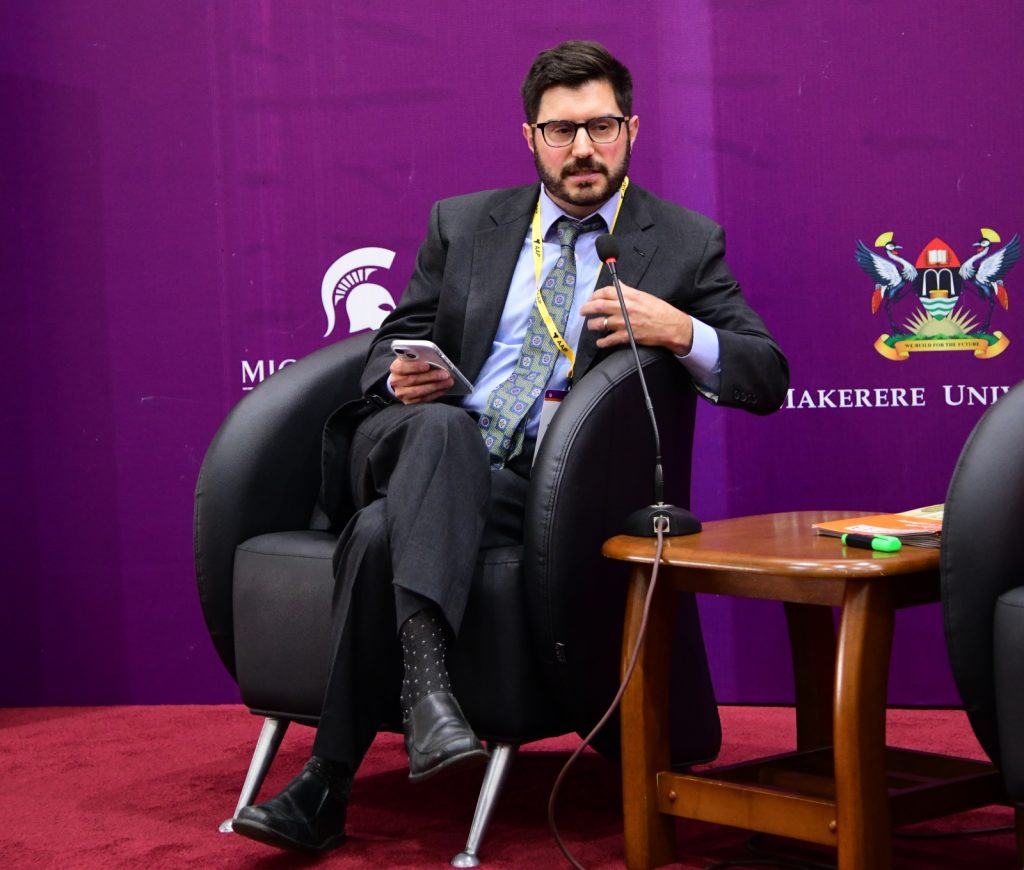
Prof. Cantwell noted that maintaining and increasing the quality and quantity of systems coupled with inclusivity would help the continent move towards the 100,000 PhDs in ten years target. Furthermore was the need to embrace the creativity and innovation that resides in people who know the needs of their communities so as to develop a new generation of scholars equipped to steer universities to navigate new challenges.
He equally stated the need for quasi-independence by universities so that they are not directly controlled by the state, so as to be able to professionalise their workforce and enhance their salaries competitively. Prof. Cantwell further urged universities to be loosely coupled and environmentally open, to embrace networks and communication especially in the form of South-South partnerships and concluded calling on the State, Private Sector, NGOs, CSOs and Multinationals to fund the research and resource intensiveness of universities.
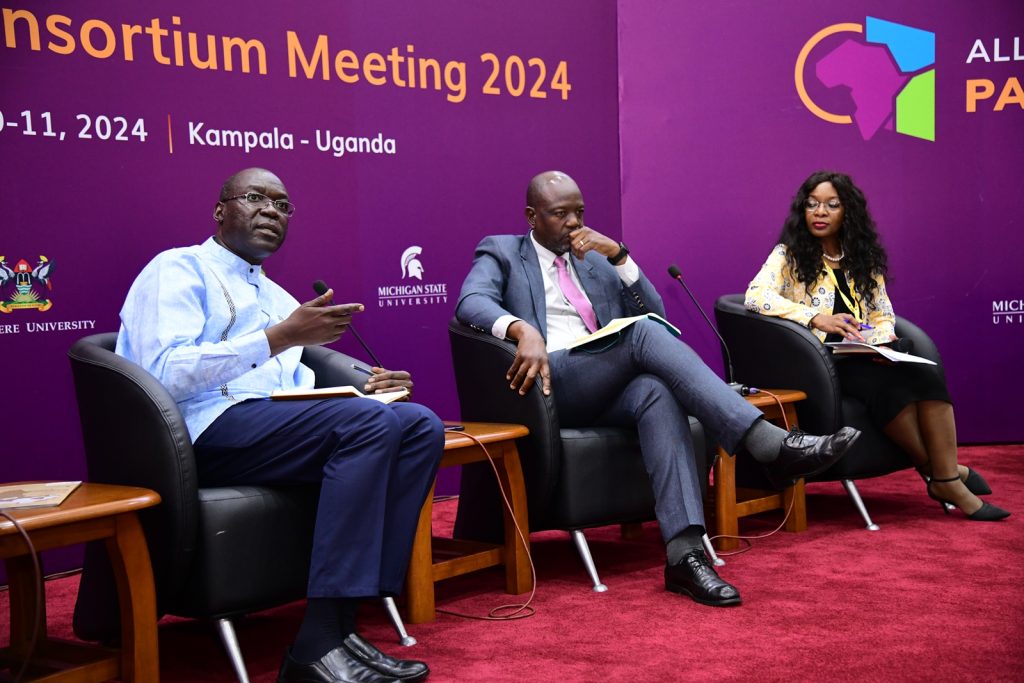
Prof. Okori on his part observed that whereas universities account for 40% of Full-Time Equivalent (FTE) scientists, they spend most of their time teaching and less of it innovating. He therefore called for the need for universities to focus on training transformative leaders across staff and communities as well as produce science solutions that are relevant to societal needs and scalable so as to attract funding.
On the need for innovative curricula, he shared that RUFORUM embraced coursework-based PhD which have increased the number of candidates trained and strengthened Agri-food systems resilience in Africa, with particular emphasis on crop improvement. Prof. Okori equally stressed the need for Universities to shift from project-based to programmatic-based models so as to attract long-term funding and partnerships.
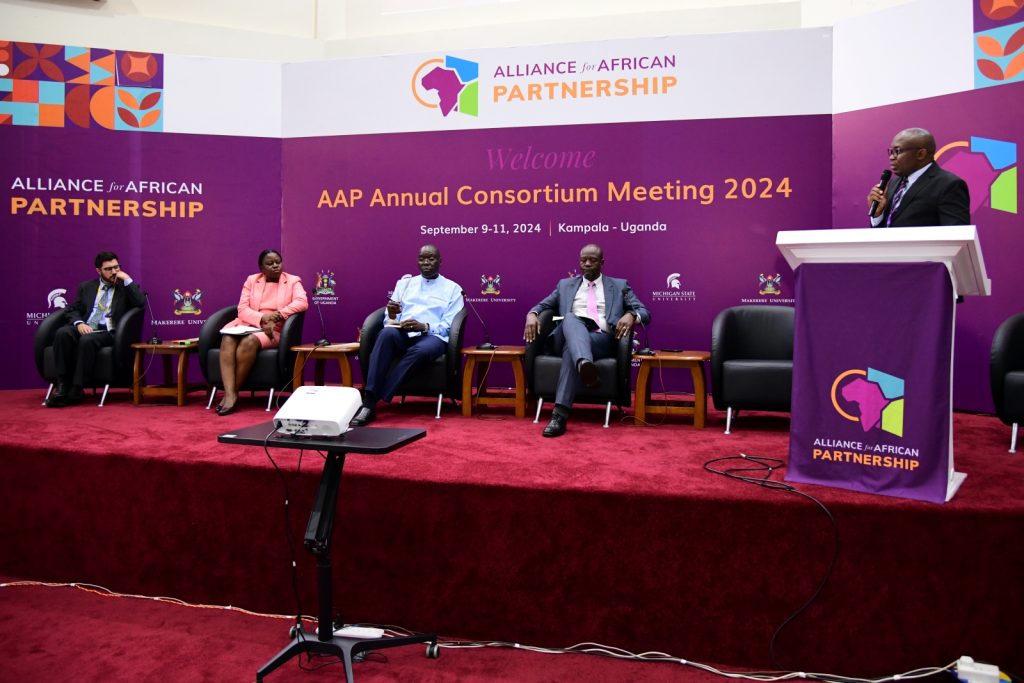
Prof. Tabulawa who shared the University of Botswana’s staff development strategy noted that the Government’s role in providing funds for staff to be trained abroad and hiring international expertise to fill local gaps was and remains fundamental. He equally shared sandwich programmes that enable staff to be trained while at work as a game changer.
He equally shared the University of Botswana’s Equity, Inclusion and Sustainability strategy that introduced an affirmative action policy that relaxed admission requirements for students with disabilities as well as those from marginalized communities as pivotal. To address the skills mismatch in the labour market, Prof. Tabulawa shared that despite its failure in other countries, the outcome-based approach to education allows for players from the industry to provide input into curricula, thereby increasing relevance of programmes taught.
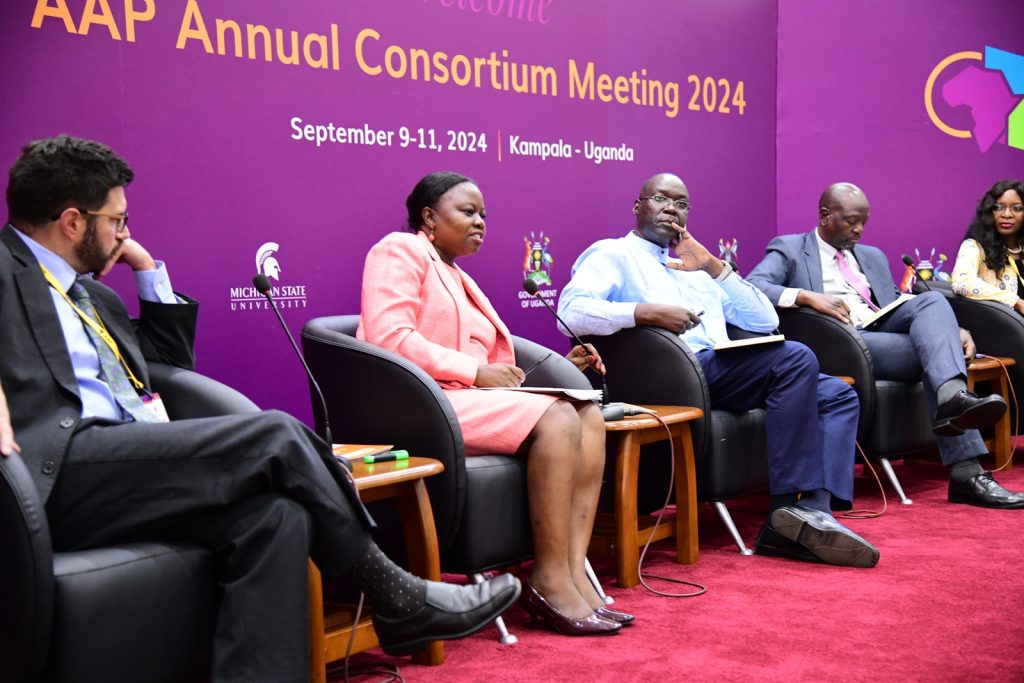
Tackling the gender perspective, Dr. Nansubuga shared that whereas Makerere has achieved gender parity at undergraduate level, the same is yet to be achieved at postgraduate level due to a number of barriers. These, she added, have been identified over time and embedded into HERS-EA innovative curriculum that aims to shape female leaders’ career and professional development aspirations.
As such, HERS-EA has carried out policy advocacy workshops with male allies and mentorship workshops that help women develop their PhD concepts and identify supervisors. Dr. Nansubuga added that HERS-EA enables female leaders to tap into global partnerships for grants and as a result of these empowerment initiatives, eight of the female graduates from the HERS-EA Academy have become Deans. She nevertheless highlighted the need to do more at a higher level, as majority of female leaders who attend the Academy have receive support from their Schools, Colleges, Administrative Units and the Vice Chancellor’s Office, which she applauded for the enormous support, including granting HERS-EA Office Space.
Concluding Remarks
The Dialogue was closed by Prof. Mwenda Ntarangwi, Vice Chancellor, USIU-Africa who urged participants to always distinguish between proactive and reactive responses opportunities, the former being preferable as it caters for the partners’ strategic objectives. Secondly, he urged institutions to have a stake in partnerships so as to work towards their survival. He equally called for examination of what institutions bring to the table that others can tap into, citing the launch of the Centre of Excellence for Sickle Cell Anemia and Other Neglected Tropical Diseases as a show of great commitment by the Government of Uganda.
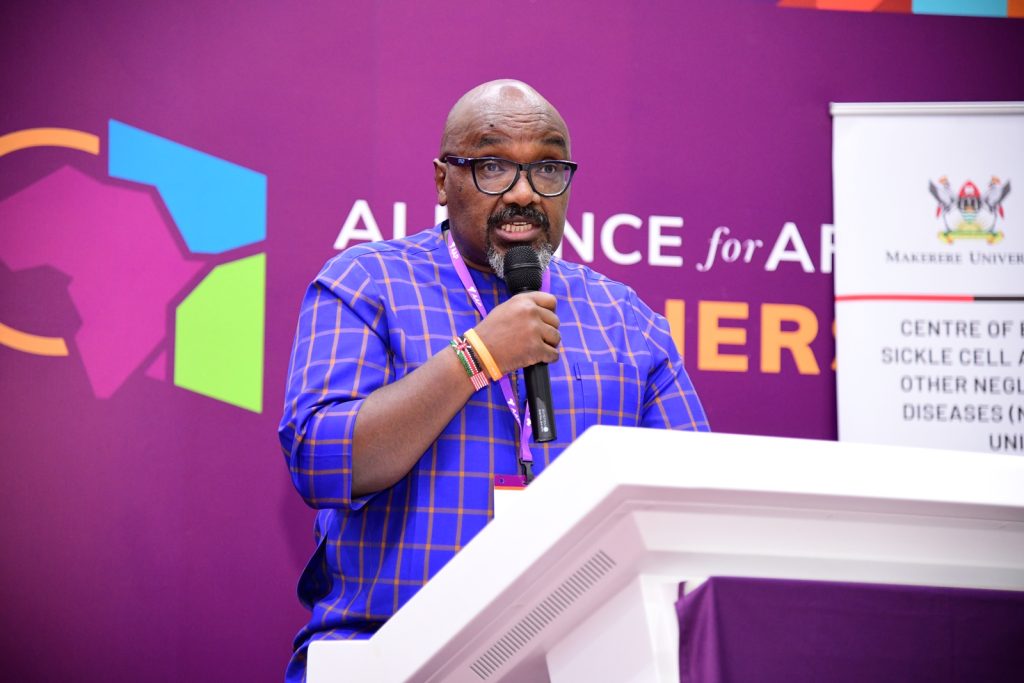
“What it means, and I hope this is true, is that the results of the research being done here will be applied to solving problems that the Government has identified as priority” added Prof. Ntarangwi.
He concluded by adding that AAP Members were gathered at Makerere, not because they didn’t have convention centres of their own but because it is important to work together. “Conflict, disease and climate change have demonstrated to us that there are no boundaries that can keep all these things out.”
You may like
-


Simplicity, Service & Scholarship: Hallmarks of Professor Livingstone Luboobi’s Legacy
-


EfD-Mak Holds 2nd Advisory Board Meeting: Charts Path for Growth
-


Public University Legal and Accounting Officers Trained on Governance and Compliance
-


Celebrating the Life of Prof. Livingstone Sserwadda Luboobi
-


Fare Thee Well Prof. Luboobi
-


Strengthening Grants Management Through Institutional Collaboration and Capacity Building
General
Simplicity, Service & Scholarship: Hallmarks of Professor Livingstone Luboobi’s Legacy
Published
9 hours agoon
July 18, 2025By
Eve Nakyanzi
On Wednesday 16th July 2025, Makerere University lost one of its most cherished sons, Professor Livingstone Sserwadda Luboobi. Described as a mathematician, academic leader, and humble servant, Professor Luboobi devoted more than five decades to the university, rising through the ranks to become Vice Chancellor, and leaving a legacy defined by simplicity, service, and scholarship.
Born to Lameka Serwadda and Sanyu Serwadda on 25th December 1944 in Mitondo, Kalisizo, Kyotera District, Professor Luboobi’s academic career begun as a third-year student at Makerere and continued with unwavering loyalty until his passing. His life’s work reflected not only a commitment to mathematics but also nurturing generations of scholars and leaders across Uganda and beyond.
A funeral service was held in his honour at St. Francis Chapel, Makerere University on 18th July 2025. It was a moment of solemn remembrance and heartfelt tribute. Rev. Canon Dr. John Senyonyi delivered the sermon titled “Only God Knows,” reminding mourners of the mystery and grace of life’s journey. Rev. Canon Geoffrey Byarugaba represented the Kampala Diocese at the service, while former St. Francis Chaplain, Rev. Dr. Canon Johnson Ebong thanked Professor Luboobi for spearheading the Chapel’s expansion. Friends, colleagues, and family members filled the chapel, joined in mourning but also in gratitude for a life that had deeply touched theirs.

Mrs. Lorna Magara, Chairperson of the University Council, spoke movingly about Professor Luboobi’s faithfulness, likening his life to the biblical call in Mark 10:43, “Whoever wants to become great among you must be your servant.”
In his condolence message, the Vice Chancellor, Professor Barnabas Nawangwe, hailed Professor Luboobi as a visionary leader whose legacy is deeply woven into Makerere’s identity as a research-led institution. He credited Professor Luboobi with laying the groundwork for a culture of inquiry—championing graduate programmes, encouraging doctoral training, and fostering international collaborations that strengthened the university’s research profile. “He believed in building systems, not just structures,” noting that many of Makerere’s current research policies stem from his leadership. Even in retirement, Professor Luboobi remained a source of wisdom and guidance, quietly shaping the future of the university he so deeply loved.
Speaker after speaker painted a portrait of a man who led not by pomp, but by quiet strength and deep conviction. The Principal, Professor Winston Tumps Ireeta, speaking on behalf of the College of Natural Sciences (CoNAS), described Professor Luboobi as a foundational figure whose influence is deeply etched in the structures and spirit of the college. He spoke with emotion about Luboobi’s unwavering commitment to academic integrity and his belief in the power of mentorship.

“He was not just a mathematician,” Professor Ireeta said, “he was a visionary who understood the soul of the university. Even in retirement, he remained an advisor, a guide, and a quiet force of wisdom.” He concluded by saying that the college would continue to draw from his example as it navigates the future of science and innovation in Uganda.
Professor Luboobi’s illustrious career at Makerere University included serving as Head, Department of Mathematics from 1990 to 1991. The current Head of Department, Dr. Ismail Mirumbe remembered him as a pillar in the teaching and development of mathematics in Uganda
Professor John Mango, who served as Head, Department of Mathematics during Professor Luboobi’s term as Vice Chancellor from 2004 to 2009 described him as a towering figure of integrity and principle, someone who not only upheld the highest standards of academic conduct but insisted that others around him do the same. “He was a pillar in the department,” Prof. Mango remarked, “and his moral compass was unwavering.”

He recalled instances where Professor Luboobi made firm decisions, including terminating contracts when integrity was compromised, setting a tone that shaped the department’s reputation for honesty and excellence. Even as Vice Chancellor, he remained deeply involved in the department’s affairs, teaching, supervising students, all the while handling top administrative duties punctually. Prof. Mango spoke with great admiration of a man who led by example, mentored many, and whose contributions to mathematics education, research, and policy-making continue to shape the future of the discipline in Uganda and beyond.
According to an article from 1990 written by Dr. Vincent Ssembatya and Andrew Vince at the University of Florida, the Uganda Mathematical Society (UMS), which was formally established on 25th November, 1972 has since inception enjoyed major support from Makerere University and Kyambogo University in terms of infrastructure and leadership. Professor Paul Mugambi, who was also present at Professor Luboobi’s funeral service was elected first president of the UMS. Dr. Saul Nsubuga from the Department of Mathematics represented UMS at the service, honouring Professor Luboobi’s pioneering role in the discipline.
The service also featured tributes from close friends and family. Loved ones shared stories of a man who remained grounded no matter how high he rose, a man who valued relationships and walked closely with his faith. His children and grandchildren remembered him as a father who was ever-present, a listener, and a source of steady guidance.

Professor Daniel Kibuule, son of the late Professor Luboobi and Dean, Faculty of Health Sciences at Busitema University, delivered a deeply personal tribute that painted a full portrait of his father’s life, values, and final days. He expressed gratitude to the University leadership, family, friends, and medical professionals who stood with them during a challenging period. He particularly thanked his siblings, Dr. David Kimera and Dr. Irene Nakiyimba for their unwavering role in caring for Professor Luboobi through illness.
He spoke of a man who, despite great academic accolades, remained deeply humble and committed to discipline, simplicity, and faith. From instilling punctuality and responsibility to ensuring his children charted their own paths, none bearing his surname “Luboobi”, Prof. Luboobi was intentional in every lesson he passed on. Kibuule recalled his father’s insistence on being at home even in his final moments, his strong connection to Christ, and his quiet strength despite his failing health.
Former students and mentees echoed the same sentiments, of a teacher who was generous with his time and invested deeply in others’ growth. The community that gathered was not only there to grieve but to celebrate the quiet legacy of a man whose example continues to live on.
Among the mourners were public figures and leaders, including Hon. Abed Bwanika, Member of Parliament for Kimanya-Kabonera, Hon. Nyombi Thembo, the Executive Director Uganda Communications Commission, and Hon. Dr. Ham-Mukasa Mulira, former Minister of ICT, among others.
In his passing, Makerere University has lost a pillar, but his life reminds us that greatness lies in consistency, in humility, and in service to others. Professor Luboobi’s memory will continue to live on in the minds he shaped, the systems he built, and the values he embodied. He ran his race with grace.
The Writer is a Volunteer in the Public Relations Office, Makerere University
Please click the embedded video below to view the service livestream
General
Public University Legal and Accounting Officers Trained on Governance and Compliance
Published
2 days agoon
July 17, 2025By
Eve Nakyanzi
Legal and accounting officers from public universities across Uganda have convened, for a high-level training workshop organized by Makerere University. The three-day training, taking place from July 16th to 18th, 2025, is aimed at strengthening legal frameworks, improving institutional governance, and ensuring compliance with public finance and procurement laws within higher education institutions.
Ms. Lorna Magara, Chairperson of the Makerere University Council and Guest of Honour at the opening session, commended the initiative as timely and necessary. She addressed the growing backlog of court cases affecting Makerere and other public universities and outlined measures already taken to mitigate legal risks. These include the establishment of a Legal Rules and Privileges Committee and the Directorate of Legal Affairs, part of a broader strategy to improve legal compliance and foster good governance.
Representing the Vice Chancellor, Prof. Winston Tumps – Ag. Deputy Vice Chancellor (Finance and Administration), described the training as both strategic and practical. “It is imperative that we learn from each other, especially in how we handle employee litigation and institutional legal risks,” he remarked. He added that the program is designed to promote experience-sharing across universities and enhance collective institutional growth.

In his address, Mr. Yusuf Kiranda, University Secretary at Makerere University, emphasized the urgent need for robust legal oversight and more effective case management mechanisms within public universities.
The training featured a keynote address by the Attorney General of Uganda, Hon. Kiryowa Kiwanuka, who provided critical insights into legal expectations for public institutions. He warned that failure to heed legal advice could result in personal liability for accounting officers, citing a precedent involving the Uganda Cancer Institute. “Universities must consult the Attorney General’s chambers before entering into major contractual obligations,” he advised, urging legal officers to document decisions meticulously as proper record-keeping forms the first line of defense in legal disputes.

Hon. Kiwanuka further discussed the government’s ongoing efforts to recentralize legal services to ensure alignment with the Attorney General’s office. He cautioned in-house counsel against becoming overly entangled in decision-making processes, stressing the need for objectivity. Other key issues he addressed included contract approvals, misuse of Memoranda of Understanding (MoUs), and lapses in procurement processes, particularly at the close of financial years.
Participants also benefited from insights by Hon. Justice Musa Ssekaana of the Court of Appeal, who offered an in-depth analysis of judicial review and its significance in promoting lawful, transparent university governance. He called on university legal officers to act with clarity, timeliness, and accountability.
Lady Justice Joyce Kavuma, Judge of the High Court, delivered a comprehensive presentation on dispute and claim management involving public universities. She addressed emerging trends in civil litigation, emphasizing the importance of due process, transparency, and clear communication in resolving employment, student, and contractual disputes. Drawing on real case examples, she urged institutions to strengthen internal systems, embrace participatory governance, and adopt regional best practices to minimize litigation and protect institutional reputation.

The training reflects a shared commitment among public universities to build a more accountable, legally sound, and strategically aligned higher education system in Uganda. Through peer learning and collaboration, participating institutions aim to reduce litigation, enhance institutional autonomy, and uphold the rule of law.
Participating universities include Makerere University, Kyambogo University, Mbarara University of Science and Technology, Busitema University, Mountains of the Moon University, and Lira University.
The training concludes on July 18th 2025, with sessions focusing on employment dispute management in public universities and the implications of recent PPDA Appeals Tribunal decisions on procurement and disposal practices within public entities.
General
Celebrating the Life of Prof. Livingstone Sserwadda Luboobi
Published
2 days agoon
July 17, 2025By
Mak Editor
A Visionary Leader, Seasoned Mathematician, & Humble Academician
It is with profound love and respect that we celebrate the life of Prof. Livingstone Sserwadda Luboobi, a distinguished scholar, transformative leader, and beloved Vice Chancellor Emeritus of Makerere University. His legacy is woven in the fabric of African higher education, marked by intellectual brilliance, unwavering commitment to academic excellence, and a life of selfless service.
A Life of Purpose and Vision
Prof. Luboobi was more than a mathematician. He was a visionary, whose work transcended equations and research papers. Serving as Vice Chancellor from 2004 to 2009, he led Makerere University through a critical period of growth and transformation. Under his guidance, the university expanded its reach, strengthened its academic rigor, and embraced innovation and reform. His calm demeanour and principled decision-making earned the admiration of students, faculty, and peers alike.
Prof. Luboobi was deeply committed to nurturing talent and fostering intellectual curiosity, leaving an indelible mark on the institution’s culture and future direction.
Beyond Uganda, Prof. Luboobi’s influence resonated across the global academic community. He was a passionate advocate for the transformative power of science and education, often speaking at international forums and collaborating on research that bridged continents and disciplines. His work helped elevate the profile of African scholarship on the world stage.
His legacy endures not only in the impressive body of work he left behind but also in the countless lives he touched – students, educators, and leaders who continue to draw inspiration from him.
Academic and Leadership Journey at Makerere University
An illustrious alumnus of Makerere University, Prof. Luboobi graduated with First Class Honours in Mathematics, laying the foundation for an extraordinary academic journey. He pursued further studies at the University of Toronto (MSc in Operations Research, 1971-72) and the University of Adelaide (PhD in Biomathematics, 1978–80). His scholarly journey spanned prestigious institutions worldwide, including UCLA, the University of Bergen, and the University of Dar es Salaam, establishing him as a scholar of global repute and a proud ambassador of African intellectualism.
Prof. Luboobi’s service to Makerere begun in 1970 as a Special Assistant-remarkably, while still an undergraduate, rising through the ranks to full Professor in 1997. He served as Head of Department, Dean of the Faculty of Science (1994–2001), and later became the university’s first elected Vice Chancellor. His tenure brought new energy to institutional leadership, characterized by transparency, inclusivity, strategic direction and accountability.
Strategic Reforms and Institutional Impact
A true architect of transformation, Prof. Luboobi chaired the development of Makerere’s first locally-conceived Strategic Plan (1990–91). He was instrumental in securing a UGX30 billion grant from NORAD in 1999, which revitalized key academic areas such as computing, gender studies, and food science. He co-founded the Makerere University Private Sector Forum, bridging the gap between academia and industry, and strengthening alumni engagement and resource mobilization.
Pioneering Biomathematics and Mentorship
As one of Africa’s pioneering biomathematicians, Prof. Luboobi introduced mathematical modeling to tackle real-world problems in epidemiology, ecology, and operations research. His scholarly contributions – over 150 publications – reflect the depth and breadth of his research. Yet, perhaps his most lasting impact lies in mentorship: he supervised more than 35 PhD and over 50 MSc students, including Makerere’s first female PhD graduate in Mathematics, nurturing a generation of scholars and leaders.
Prof. Luboobi’s Contribution to the Internationalization of Makerere University
Prof. Luboobi played a pivotal role in advancing the international profile of Makerere University. Demonstrating remarkable personal commitment, he utilized his own resources to support the establishment of the University’s International Office. This strategic initiative laid the foundation for a more structured and effective engagement with global academic institutions, development partners, and international students. As a result, Makerere University significantly enhanced its global footprint, forming numerous international collaborations and attracting increased academic and research opportunities from abroad.
In addition to his contributions to internationalization, Prof. Luboobi was also instrumental in revitalizing the University’s Public Relations Unit. Under his guidance, the unit adopted more proactive and professional communication strategies, which greatly improved the institution’s public image. This, in turn, fostered greater public trust and strengthened the university’s reputation both locally and internationally. His visionary leadership in these areas has had a lasting impact, positioning Makerere University as a leading institution in East Africa and beyond.
Global Recognition and Enduring Legacy
Prof. Luboobi’s contributions earned him widespread recognition. In 2008, the University of Bergen awarded him an Honorary Doctorate for his role in internationalizing academia. Makerere University honoured him with a Lifetime Achievement Award in 2013, and the Government of Uganda conferred upon him a National Gold Medal for his unwavering service to education and national development.
Even after retirement, Prof. Luboobi remained an active contributor to academic life-lecturing, supervising, and advising the university.
A Lasting Light in African Academia
Prof. Livingstone Sserwadda Luboobi’s life was a model of scholarship anchored in service, leadership tempered with humility, and an unshakable belief in the power of education. He leaves behind a vibrant academic legacy and a trail of inspired minds. His contributions will continue to shape Makerere University, Uganda, and the global academic community for generations to come.
We extend our heartfelt condolences to his family, colleagues, and the entire Makerere University community during this difficult time.
May his soul rest in eternal peace.
Trending
-

 General2 weeks ago
General2 weeks agoRe-advert: Admission to Undergraduate Programmes 2025/2026
-

 General1 week ago
General1 week agoRe-Advert for Applications for Diploma and Certificate Training
-

 General5 days ago
General5 days agoMakerere University Fees Waiver for 40 First Year Female Students 2025/2026
-

 General2 weeks ago
General2 weeks agoPress Statement on Ranking
-

 Health1 week ago
Health1 week agoCall for Applications: Responsible Conduct of Research (RCR) Training Course
